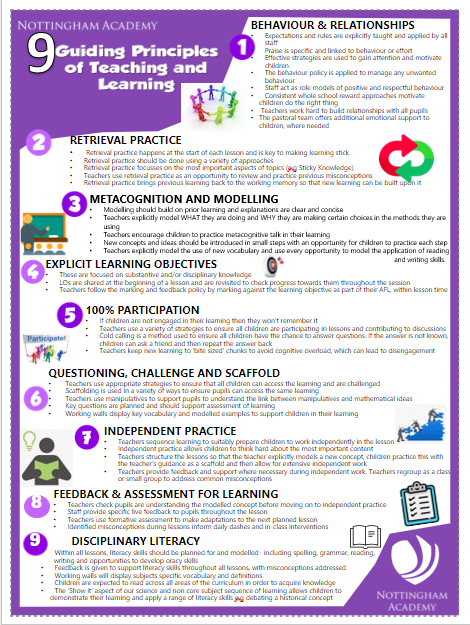Curriculum at NAP
Our Curriculum Intent
We strive to prepare all pupils to become confident and responsible individuals, who aspire to achieve their full potential through the acquisition of knowledge and skills, critical thinking, creativity and self-motivation in order to succeed in the future. We will do this by providing a stimulating, happy, safe and inclusive learning environment where curiosity is fostered, and all pupils are valued and respected.
We have three key strands to our curriculum:
Academic Curriculum
We strive for excellence through a broad and balanced curriculum which encourages critical thinking, development of skills, acquisition of knowledge and prepares our children for their next stage in their education and life beyond. Our curriculum is ambitious, captivating and stimulating to allow our pupils to develop an appetite for more learning. Our Academic curriculum encourages children to see making a mistake as an opportunity for learning to occur. Children will revisit and build on their prior learning to ensure knowledge is transferred to their long-term memory. Reading, particularly early reading, is high priority and permeates all aspects of the curriculum. We recognise that language development and the acquisition of new vocabulary is significant to the success of our pupils and therefore, we encourage the explicit teaching of key vocabulary across all aspects of the curriculum.
At Nottingham Academy we recognise that all pupils learn differently and at different rates. Therefore, some children may need additional support to access their learning. Staff will ensure they consider their teaching approaches, resources and work with relevant external professionals or agencies in order to ensure all children achieve their academic potential.
Character Curriculum 
Our children will be taught to develop persistence, self-control, curiosity, compassion, and determination in order to build the qualities and traits needed to become resilient, self-motivated and confident learners. Our Character curriculum is explicit and implicit and is underpinned by our six core values which are at the heart of our school ethos and ensure positive learning behaviours are nurtured:
- Play fairly and thoughtfully
- Use your talents to achieve your best
- Listen to the views of others
- Respect the environment around us
- Respect all relationships
- Show resilience of body and mind
At Nottingham Academy, we recognise the importance of diversity and celebrate the differences amongst us. Many of the books and texts we use to drive our curriculum are selected with the purpose of giving children exposure to diverse characters, challenging stereotypes and tackling issues within society. Our RE and PSHE curriculum give opportunities for high-quality teacher-led discussions around the understanding of a range of cultures and developing respect for all members of society. We provide opportunities for our pupils to visit places of worship, make connections with the local community and provide opportunities for celebration of differences, including our whole school Culture Days. With this, we are ensuring that the pupils of Nottingham Academy are taught how to be respectful and caring member of society and are well-prepared for life beyond school.
Opportunities and Entitlement 
Our inclusive approach ensures that all children experience high quality education and exciting experiences which will support and enrich their learning, enhance self-fulfilment and encourage them to become active and responsible citizens in the community. This promotes success in a wide range of extra-curricular activities and enables children to discover life-long interests and talents. The Opportunities and Entitlement curriculum ensures teachers are planning for meaningful experiences which not only captivate and excite pupils in their learning but allow them to get involved with something new to them, contribute to a team or the community and discover something new about themselves. T
Implementation
- Our detailed curriculum maps are produced for each year group and subject area to ensure clarity of coverage, with a strong emphasis on progression of knowledge and skills.
- Our coherently planned curriculum has been sequenced to allow pupils to revisit, practice and transfer knowledge and skills, and for new learning to be built upon what pupils already know.
- Our Nottingham Academy progression documents outline substantive and disciplinary knowledge and highlight links to prior learning and to other curriculum areas to support opportunities to transfer knowledge to a new context.
- Some of our curriculum content is subject specific, whilst other aspects combine a cross-curricular approach, enabling our children to put knowledge into context.
- At Nottingham Academy we have decided on the ‘invaluable knowledge’ that we want our pupils to know as the content of our curriculum. We call this our 'Sticky Knowledge'. Topics begin and end with a quiz based on the sticky knowledge of that particular topic, so that progression of learning can be seen and then gaps in knowledge are used to inform future learning.
- Teaching and learning is designed to ensure the experience of all learners is engaging and creates a passion for the subjects being taught.
- Teachers assess children’s understanding throughout lessons and give children effective feedback that leads all pupils to feel supported and challenged to meet their potential. Teachers identify misconceptions and plan for pupils next steps in learning.
- Our pupils are taught to develop positive learning behaviours through the application of our behaviour curriculum.
- Our experienced and supportive pastoral team offer additional help and provision to pupils, where necessary, to ensure every child at Nottingham Academy meets their potential.
- Reading is prioritised at Nottingham Academy as we believe this is a vital skill to unlock life-long learning. This is evident in the curriculum time dedicated to it.
- The school’s reading curriculum encompasses phonics, developing fluency, comprehension, as well as reading for pleasure. In practice, this can be seen in daily phonics lessons (using the validated Little Wandle Phonics scheme) guided reading sessions, English lessons, in class story time and throughout other areas of the curriculum.
- A range of texts are used which have been specifically chosen to ensure quality (vocabulary, structure, composition and effect), breadth of study and which align to the school’s context.
- Our topic drivers/ themes are often linked to Science, History or Geography with guided reading and English texts closely linked to ensure the opportunity to build and revisit knowledge.
- Our KS2 Reading Ambassadors act as role models for younger pupils, listening to them read regularly.
- A whole-school reading incentives scheme has also been introduced which rewards pupils for displaying positive reading behaviours both in school and at home.
- The school has introduced The Write Stuff, as an approach, to scaffold, structure and provide consistency to English lessons across the school. This aims to promote improvements in writing and in the acquisition of vocabulary.
- Learning is supported by the classroom environment, which provides models, scaffolds and resources which pupils can access independently so that they can achieve success.
- Materials used within the teaching and learning sequence are carefully chosen to support and stretch pupils, providing challenge and opportunities to deepen and extend their knowledge and understanding.
- A consistent pedagogical approach underpins the implementation of our curriculum. This approach is evidence-informed and can be seen across the school through our 9 principles of teaching and learning. This ensures that all pupils receive high-quality learning experiences throughout school.

A full document detailing our 9 Principles of effective teaching and learning can be found using the link below.
- When planning the sequence of learning for Science and non-core subjects, teachers use the following key aspects:
 LINK IT! Using our school progression documents, teachers consider links to prior learning in order for children to build on what they already know.
LINK IT! Using our school progression documents, teachers consider links to prior learning in order for children to build on what they already know.
![]() LEARN IT! Teachers plan and deliver engaging and meaningful learning opportunities with explicit teacher modelling, opportunities for children to talk, collaborate and think critically and creatively.
LEARN IT! Teachers plan and deliver engaging and meaningful learning opportunities with explicit teacher modelling, opportunities for children to talk, collaborate and think critically and creatively.
 CHECK IT! Teachers plan for opportunities to review and check learning each lesson to ensure adaptations can be made to the next lesson.
CHECK IT! Teachers plan for opportunities to review and check learning each lesson to ensure adaptations can be made to the next lesson.
 SHOW IT! At the end of a unit of work, children are given the chance to showcase what they have learnt, individually, in groups or as a class. This is done in a variety of creative ways, drawing on skills from other subjects.
SHOW IT! At the end of a unit of work, children are given the chance to showcase what they have learnt, individually, in groups or as a class. This is done in a variety of creative ways, drawing on skills from other subjects.
![]() KNOW IT! A unit of work ends with a Sticky Knowledge quiz which allows the children to demonstrate the knowledge they have acquired. This will show progress made from the same quiz taken at the beginning of the unit of work.
KNOW IT! A unit of work ends with a Sticky Knowledge quiz which allows the children to demonstrate the knowledge they have acquired. This will show progress made from the same quiz taken at the beginning of the unit of work.
- A key principle is retrieval practice, which takes place at the beginning of every lesson as a useful revision and effective learning technique that helps in memory retention of key knowledge.
- In practice, teachers will plan for children to recap their Sticky Knowledge in a variety of fun and active ways. We know that everybody forgets things unless they revisit information, so by using retrieval practice we are interrupting the process of forgetting. This supports children in ensuring that 'Sticky Knowledge' can stay with them forever. Examples of types of retrieval practice strategies we use in school can be found using the link below.
Impact
- Monitoring shows that the detailed progression documents allow teachers to plan well-sequenced lessons that build on prior learning.
- Daily retrieval practice supports our children in embedding knowledge into their long-term memories and allows them to confidently remember and talk about their learning.
- Pupil voice shows that regular enrichment opportunities across the curriculum allow children to engage in new, exciting and memorable learning experiences which support their episodic memory and means they can recall knowledge linked to the experiences.
- Children take pride in their books, especially demonstrating their knowledge acquired through their 'show it' pieces of work at the end of units of work.
- Our Sticky Knowledge makes it clear to children what they should know and remember by the end of the unit of work. Children are proud of the progress they can see in their pre-and post-topic Sticky Knowledge quizzes.
- Children make good progress as teachers target gaps in learning through the use of daily formative assessment and regular summative assessments to inform and make adaptations to lessons.
- Parents enjoy seeing what the children have been learning and are impressed by the work they share during their year group curriculum showcase events.
- The impact of our behaviour curriculum and high quality lessons driven by our 9 Principles of teaching and learning, is that children behave well and engage positively in their learning.
- All children, irrespective of any additional needs, make good progress in school as a result of our skilled pastoral team and dedicated staff within our Enhanced Provision.
- Children make good progress in their reading ability as a result of rigorous phonics teaching, well-structured daily guided reading sessions and opportunities to practice and apply their reading skills through all lessons across the curriculum.
- Pupils are responding incredibly well to our reading incentive scheme. They know and can demonstrate positive reading behaviours. This is evident through the high number of children receiving regular rewards as they reach the prize bands of the scheme.
- Children are thriving in their writing ability through the consistent and well-structured Write Stuff approach to teaching.
